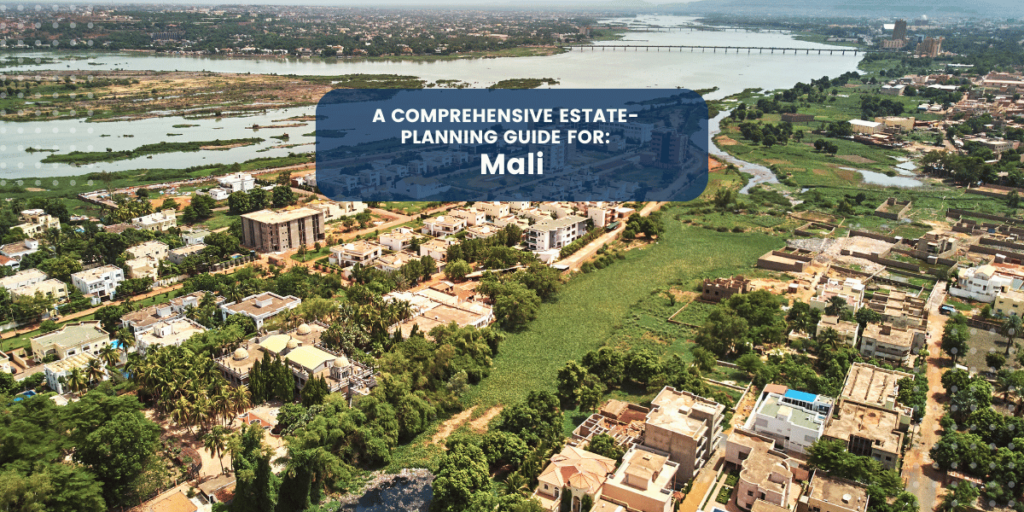Estate Planning in Mali: A Comprehensive Guide to Safeguarding Your Legacy
Introduction
Mali, renowned for its vibrant culture and historical treasures like Timbuktu, presents a unique landscape for estate planning. With a mix of traditional, religious, and legal influences, securing one’s legacy in Mali can be a complex process.
The Wills App offers a seamless way to navigate these challenges, providing secure document storage, automated distribution, and tailored estate planning solutions for residents and expats.
Overview of Estate Planning in Mali
Inheritance Laws
Inheritance in Mali is governed by a blend of Islamic principles and civil law:
- Property Division: For Muslim families, the Code of Persons and Family aligns with Sharia law. Non-Muslims follow civil regulations.
- Heirs’ Rights: Lineage and marital connections determine heirs, with male heirs typically receiving a larger share under Islamic rules.
Common Estate Planning Documents
- Wills: Essential for specifying asset distribution.
- Power of Attorney (POA): Used for managing assets during incapacity.
- Trusts: Rare but applicable under certain circumstances.
- Advance Directives: Increasingly used for medical decisions.
Creating a Will or Equivalent Estate Plan in Mali
Required Documentation
- Valid identification documents.
- Proof of ownership for assets (e.g., property deeds, vehicle registrations).
- Statements of family relationships or marriage certificates.
Legal Requirements
- Wills must be written and signed by the testator in the presence of at least two witnesses.
- Witnesses cannot be direct beneficiaries.
- Notarization is recommended but not mandatory.
Step-by-Step Guide
- Assess Your Assets: Compile a detailed inventory of properties, accounts, and valuables.
- Identify Heirs: Outline eligible family members and beneficiaries.
- Draft the Will: Use a legal template or consult a professional.
- Sign and Witness: Comply with Mali’s legal requirements.
- Store Securely: Use the Wills App for safe digital storage.
Tax Implications
Mali does not impose inheritance taxes on direct family members. However, international assets may be subject to tax regulations in other jurisdictions.
Navigating Local Challenges in Estate Planning
Cultural and Legal Barriers
- Traditional Norms: Verbal agreements often conflict with formal legal practices.
- Limited Awareness: Many residents are unaware of estate planning tools.
- Religious Influences: Islamic rules may override personal preferences.
Solutions via Wills App
- Store and automate the distribution of wills, ensuring compliance with local laws.
- Access multilingual support for Mali’s diverse cultural and linguistic needs.
Unique Aspects of Estate Planning in Mali
- Guardianship: Guardians for minors are typically assigned within the family, but formal documentation is advised.
- Pet Provisions: Although uncommon, pets can be included in wills informally.
- Cross-Border Considerations: International estate planning is crucial for expatriates or those with foreign assets.
Using the Wills App to Secure Your Legacy
Features and Benefits
- Secure Storage: Digitally store legal documents with encryption.
- Inactivity Timer: Automate the execution of plans upon inactivity.
- Video Messages: Attach personal messages for emotional connection.
How to Use the App
- Upload legal documents like wills and trusts.
- Set an inactivity timer for automated distributions.
- Schedule personalized video messages for loved ones.
Ethical Will and Memory Preservation
Ethical Will Concept
Ethical wills allow individuals to share life lessons and family traditions. In Mali, where oral traditions are treasured, ethical wills hold special significance.
Role of Wills App
- Record video messages or write letters to preserve values.
- Store files for posthumous delivery to ensure family traditions are upheld.
Key Estate Planning Tips for Mali
- Engage a Legal Expert: Mali’s inheritance laws are complex and require professional advice.
- Document Property Ownership: Clearly define ownership to avoid disputes.
- Address Cross-Border Assets: Plan for foreign properties and accounts.
- Educate Heirs: Inform family members about the estate plan to reduce conflicts.
- Review Regularly: Update your will every 3–5 years or after major life events.
FAQs
1. What is the legal basis for inheritance in Mali?
• Inheritance laws are based on Islamic Sharia and the civil Code of Persons and Family.
2. Is a will necessary in Mali?
• While not mandatory, a will ensures your assets are distributed as per your wishes.
3. Can non-Muslims create wills in Mali?
• Yes, non-Muslims can create wills under civil law.
4. Are verbal agreements binding?
• They may hold cultural weight but are not legally enforceable without documentation.
5. What happens if no will is made?
• Assets are distributed according to Islamic or civil inheritance laws.
6. How does the Wills App simplify estate planning?
• It provides secure storage, automation, and personalized features for global users.
7. Are inheritance taxes applicable?
• No inheritance tax applies for direct family members in Mali.
8. Can women inherit property in Mali?
• Yes, but the share may differ under Islamic laws.
9. What is the role of guardianship in estate planning?
• Guardianship for minors should be documented in the will.
10. How do I address cross-border assets?
• Use international estate planning tools like the Wills App.
Disclaimer
Have more questions? Explore additional topics in our Learning Center or connect with our customer support team through our Contact page. Wills.com provides easy-to-use legal forms and resources for estate planning. Please note that we are not a law firm and do not offer legal advice. The details in this article may be subject to change as laws, customs, and regulations evolve.



